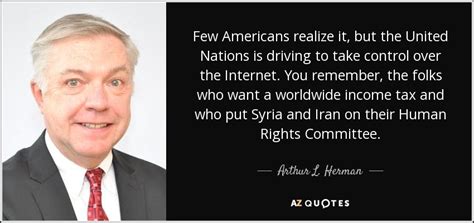A Quote by Arthur L. Herman
The most interesting statistic, stunning statistic that came out of my research was that in 1942, as this war production effort is going on, the number of Americans killed or injured in war-related industries surpassed the number of Americans in uniform killed and wounded in action in the war by a factor of 20 to 1.
Related Quotes
In every major war we have fought in the 19th and 20th centuries. Americans have been asked to pay higher taxes - and nonessential programs have been cut - to support the military effort. Yet during this Iraq war, taxes have been lowered and domestic spending has climbed. In contrast to World War I, World War II, the Korean War and Vietnam, for most Americans this conflict has entailed no economic sacrifice. The only people really sacrificing for this war are the troops and their families.
When I was arrested opposing the war in Vietnam in 1965, as I said about 20 or 30% of people were opposed to the war. By 1968, more than half of Americans were opposed to the war. If you pull in Europeans, Canadians, people from around the Third World, the war was vastly unpopular. But even half of Americans by 1968 opposed the war.
So confident am I that the number of deaths from violent storms will continue to decline that I challenge Mr. McKibben - or Al Gore, Paul Krugman, or any other climate-change doomsayer - to put his wealth where his words are. I'll bet $10,000 that the average annual number of Americans killed by tornadoes, floods and hurricanes will fall over the next 20 years. Specifically, I'll bet that the average annual number of Americans killed by these violent weather events from 2011 through 2030 will be lower than it was from 1991 through 2010.
During a single week of July 1967, 164 Americans were killed and 2100 were wounded in city riots in the United States. We are truly fighting a two-front war and doing badly in both. Each war feeds on the other and, although the President assures us that we have the resources to win both wars, in fact we are not winning either.
It is not just the vulgar, premature bawdiness of pro-war triumphalists which I find revolting. It is that they accuse anti-war people of being uncaring about the people of Iraq, and the lack of concern that these proponents of war show for the bodies of the killed and those maimed and injured by their invasion.
People realize that we're very good at sending people to war, but we're not good at taking care of them. And people are coming back from war now; years ago, they would have been killed, now they're wounded; and they're coming back alive and with post-traumatic stress. So, I think Americans are sensible enough to know we've got to figure out a way to take care of them.
People say to us, look, it may well be the case that there are fewer wars and fewer genocides, but surely more people are being killed. But when we look at this, the number of people killed in wars involving a state every year, all the wars, and you can see there's a high point, that's the Korean war, and it keeps on going down and down and down. If you look at the average number of people killed per conflict per year, it goes from 37-thousand in 1950 to just 600 in 2002.
Some 2,800 Americans went to Spain [during the Spanish Civil War], and it was, by far, the largest number of Americans before or since who've ever joined somebody else's civil war. I think they were primarily people who were deeply alarmed by the menace of fascism. They saw this on the horizon. I quote one volunteer, Maury Colow of New York, who said, "for us it was never Franco, it was always Hitler."
I want the marginality to come into the center. This is the thing I was conscious of growing up, when I later lived in England. I saw all these war movies that came out shortly after the war, and they were all about the war being fought by Englishmen or Americans, there were no other "allies" in it - from India or Australia, etc.







































